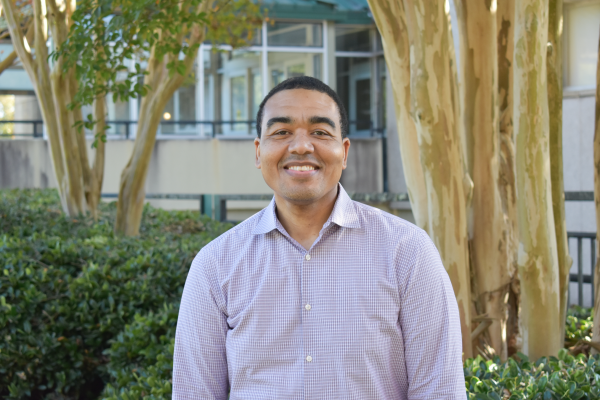
Boyd establishes roadmap for FPG
In February 2023, when a colleague asked Brian Boyd why he took on the role of interim director of the UNC Frank Porter Graham Child Development Institute (FPG), his response was immediate and heartfelt. He did so because of a longstanding connection to and respect for FPG and its mission, and he was drawn to join the Institute’s scientists, specialists, staff, and students in going about the science of doing good.
Now, as Boyd is transitioning from an interim role to a permanent one, his sentiment remains the same. “I care deeply about FPG, its mission, and its people,” says Boyd. “I am both thrilled and honored to continue going about the science of doing good here in service to children and families in North Carolina, our nation, and around the world.”
“I care deeply about FPG, its mission, and its people,” says Boyd. “I am both thrilled and honored to continue going about the science of doing good here in service to children and families in North Carolina, our nation, and around the world.”
Boyd, the William C. Friday Distinguished Professor of Education in the UNC School of Education, was named director of FPG after serving as interim director for 14 months. During that time, he thought a lot about the future of the Institute. He spoke to colleagues at FPG and across campus. He looked at the Institute’s full project portfolio, learning about the work happening at the Institute and getting to know the people doing it.
From this, Boyd envisioned FPG Next, a roadmap to guide the next three years of work at the Institute. “I created this initiative to leverage our strengths and grow and expand our project portfolio,” says Boyd. “I’m also looking to foster even more collaboration throughout FPG—across and among our research and evaluation, implementation science and technical assistance groups—and across the UNC campus.”
What is FPG Next?
FPG Next centers around three priorities: 1) strategic initiatives (see bullets below); 2) state engagement; and 3) community connections—both within FPG and extending to the broader UNC campus.
- Language and literacy in early development
- Innovative technology and data science in education (e.g. AI, wearable sensors)
- Cultural resilience and wealth of marginalized and underserved communities
- Life course perspective on developmental disability and mental health
To ensure the success of this initiative, the Institute launched six catalyst planning groups, one for each strategic initiative and one for each of the other two priorities. Each group is led by two co-chairs and has up to 10 team members—comprised of a combination of people from within FPG and other units on campus.
Research Scientist Heather Aiken, PhD, and Senior Research Scientist Ximena Franco-Jenkins, PhD, co-chair the language and literacy in early development planning group. Senior Technical Assistance Specialist Megan Vinh, PhD, and Data Management and Analysis Core Director Sabrina Zadrozny, PhD, co-chair the innovative technology and data science in education planning group. FPG Faculty Fellow and Equity Research Action Coalition Founder Iheoma Iruka, PhD, and FPG Faculty Fellow Simona Goldin, PhD, co-chair the cultural resilience and wealth of marginalized and underserved communities planning group. FPG Faculty Fellow Desiree Murray, PhD, and Senior Research Scientist Ann Sam, PhD, co-chair the life course perspective on developmental disability and mental health planning group. Implementation Associate Stephen McKinney, MA, and Senior Research Scientist Sandra Soliday Hong, PhD, co-chair the state engagement planning group. And Senior Implementation Specialist, Will Aldridge, PhD, and Interim Associate Director for Research Noreen Yazejian, PhD, co-chair the community connections planning committee.
FPG Next is an integrative framework; these planning groups are working individually on their specific strategic initiative or priority, and they are also working collaboratively as a larger body to develop strategic directions for the Institute.
For the last few months, each of the catalyst planning groups has been conducting a landscape analysis to help identify research and collaboration opportunities and forward-looking trends. This summer, they will share their findings with Boyd, and after that, they will work on new project proposals to submit for possible pilot funding.
Setting the stage for success
Boyd believes the role of a leader is to put supports and structures in place to help people succeed. And so far, he has done just that, taking a thoughtful and measured approach to leading FPG.
In addition to formulating the FPG Next initiative, he spent time selecting experts and thought leaders to form a new external advisory board. The charge of this board is to serve in a consultative capacity providing expertise and counsel relevant to the Institute’s work, with a special focus on FPG Next’s four strategic research initiatives. It will also contribute to the institute’s North Carolina state engagement efforts.
“This past year, launching FPG Next, setting up the new external advisory board, and facilitating our move to the Spangler building—I see that as scaffolding to help ensure our continued success here at the Institute,” says Boyd. “I am excited to see how FPG Next unfolds and for the new projects, collaborations, and opportunities that will arise from it.”
While addressing future projects within FPG, Boyd also considered the space in which that work is done. Working with the Office of the Vice Chancellor for Research and the University, Boyd helped facilitate the relocation and consolidation of FPG into one building that is much closer to campus. This relocation will not only help foster community and increase opportunity for collaboration within the Institute, but also with the larger UNC community.
“This past year, launching FPG Next, setting up the new external advisory board, and facilitating our move to the Spangler building—I see that as scaffolding to help ensure our continued success here at the Institute,” says Boyd. “I am excited to see how FPG Next unfolds and for the new projects, collaborations, and opportunities that will arise from it.”
